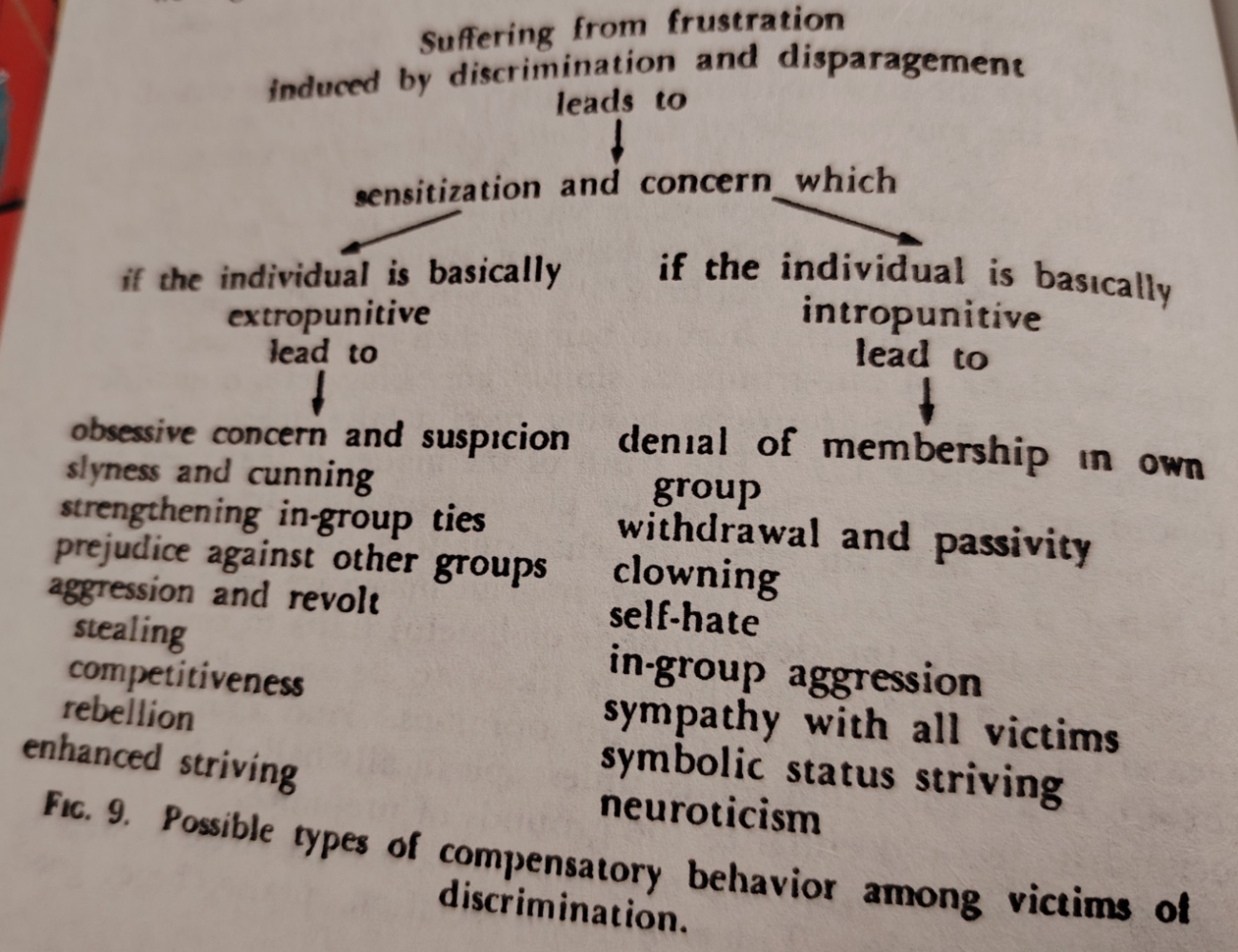
Jakob Sverre Løvstad
CTO, Seema
12 November 2025
Through a fairly long series of articles, we have looked at many of the psychological mechanisms that lead to difficulties for minorities in different contexts, according to Social Identity Theory. But something that has not been elucidated is how those who are subject to prejudice and discrimination relate to this psychologically, and also what automatic psychological responses may entail. This is obviously a big picture with potentially a lot of complexity, but Gordon Allport describes very well a number of psychological responses that many people can probably recognise, and the ambition here is to briefly provide a small list to understand a little "the thing".
Ego defence
In general terms, it can be said that many of the responses you have in the face of an environment, a system, that condemns you are about managing your own ego. You can't ignore the fact that you are subject to various negative responses, so it becomes necessary to make various internal and external responses to face it all (some conscious, but it happens more often unconsciously). And for the record, many of these responses can also be socially pleasant/satisfying for the outside world - it's not necessarily about opposition to the majority. But it's still stressful for the person in question. This will probably become obvious as you read on. And, not least, you can have several types of responses at work depending on the context you're in.
Obsessive worry
One obvious reaction to being a minority is that there is a cognitive focus on the fact that you are actually a type of diversity. And since this is actually something that is constantly being noticed and has a number of consequences, it is common to develop a kind of mild paranoia in which the assumption of being seen as diverse also comes to the fore in situations where people don't actually care. You can react to looks, ways of expressing yourself and so on that are not actually intended to be incriminating by the sender, but which nevertheless create a reaction in the diverse person in question.
Denial of your own diversity
Perhaps the easiest way to avoid recognising your own diversity is to deny it. Obviously, this is easiest if your diversity is not visible through skin colour, religious symbols, wrinkles, body shape or disability (to take the most obvious examples). By simply pretending to be like everyone else, you escape judgement and the like - although of course this is a strategy that increases shame, can create inner conflict (denying the group you're part of and feeling like you're letting them down, for example) and makes it more limited what you can express at the risk of revealing yourself.
Withdrawal and passivity
Closing yourself off is another way of dealing with your emotions. You can pretend that "everything is fine" when you're actually very unhappy with the treatment you receive as a diverse person. This is what you might call a typical avoidance strategy where you feel a lot of anger, anxiety and the like inside, but outwardly show a kind of passivised mask because you can't bear to "take the fight". Associated with this strategy is that you almost withdraw into an inner fantasy world - that you sort of go to your "happy place" where things are better. In other words, escapism.
Making a fool of yourself
In the face of prejudice, you can also choose to caricature your own diversity. Many minorities demonstrate a kind of self-deprecating, exaggerated mockery of their own otherness. They may choose to exaggerate a dialect/sociolect, use derogatory terms about themselves, exaggerate stereotypes they know the outside world has of the group they belong to and so on. In a way, you pre-empt the world's prejudices so that you take the sting out of the problem before others get the chance to start making fun.
Strengthen ties to your own group
In the face of threats, people who are part of a diverse community can withdraw to their own in-group. From the outside, a lot of criticism can arise because it is seen that certain groups choose to live close to each other, keep to themselves and create a kind of "clan mentality". But what is often not understood by the outside world is that this is a natural response for minority groups when faced with perceived threats from the outside world - then it is important to stand stronger with their own rather than focusing on integrating and being on the supply side for the majority.
Craftiness and cunning
This may sound a little too verbal, but in practice it's about having a different perception of ethics for your own group versus other groups. So for your own in-group, you are expected to be very fair and balanced, while you don't need to treat out-groups particularly well. The consequence for minority groups is a potentially strong need to be decent to their own people, but not necessarily to the majority in society, for example. In a way, it's a rather petty way of getting a bit of revenge on those who are the source of prejudice and discrimination.
Identification with the majority and associated self-hatred
When you are helpless in the face of the majority, the majority's system and the prejudices they choose to hold, it can lead to you simply having to accept that, as a minority, you are actually a deviation. Instead, you begin to wonder whether there is actually something fundamentally wrong with yourself because you're being stepped on and you can't do anything about it - which then leads to self-hatred. And this is also expressed by many minorities: That they simply hate their roots, their skin colour, their orientation or whatever. The role of "wrong" becomes part of their identity.
Aggression against own group
As an extension of self-hatred, you can also end up hating your own group. Rather than directing your anger at the majority and the system that perpetuates the prejudice, it is possible to think that members of your own group are the reason things are going badly. So you can start to use the same derogatory words and narratives as the outside world when describing groups you actually come from, and in practice want them to "shape up" or worse.
Prejudice against other outgroups
Different minorities can exist in an internal hierarchy. For example, in the drug scene, someone who does cocaine at a party is often held in higher esteem than someone who sniffs glue under a bridge. So one way to feel better about your own diversity group is to step on someone else who you think is further down the hierarchy than you are. In other words, "OK, I do cocaine, but at least I'm not a glue sniffer". The same goes for sexual orientations, ethnicities, body types and most other things - there's always someone further down the internal hierarchy.
Sympathy
As a counterbalance to prejudice against other minorities (in the previous section), minority groups can also feel strong sympathy for other groups that may be perceived to have it even worse. This is also ego-strengthening in its own way, but takes a less negative form - people opt out of the pecking order in favour of strengthening their own position through compassion. Being able to sympathise with someone puts you in a position of power, even if it's less dark than condemning down the chain.
Fighting back
At some point, members of different minorities may actually get tired of being trodden on and choose to actually fight back in various ways. This can take the form of anything from dramatic demonstrations to more formal legal processes or activism, but either way, the point is to collectively try to change a world/system that oppresses and condemns.
Strengthened efforts
As we know, many minorities manage their position by trying to be even better than the majority. In Norway, we have the cliché that immigrants, for example, often go for the ALI subjects and have to prove that they are a few notches sharper than those "born in". This enhances the reputation of the groups in question in the long term, but is also naturally very demanding and creates performance anxiety. And the road to falling off the high horse is far shorter than for those who are part of the majority ("that's what we knew, you weren't really that good").
Symbolic status
This is the surface version of "reinforced effort", where a minority tries to take part in activities or obtain things that symbolise high status with the majority in society. By wearing certain clothes, living somewhere nice, being extra keen to celebrate the 17th of May and so on, people in Norway can show that they are at least as good as the majority on a purely visible symbolic level.
Neuroticism
This is probably the closest thing we often refer to today as "minority stress", i.e. that as a minority group you may be more prone to hypertension, mental pathology and other things that are simply a result of negative psychological responses propagating into your health in one way or another. You are alert, you feel stress, and through the body's stress-regulating system (the so-called HPA axis, for example) you are affected in a number of problematic ways.
Summarising
With a bit of modern psychological insight, you can imagine that most of the above is a result of shame responses when you experience prejudice and/or discrimination. By extension, Allport has also created a small model that indicates why people choose one or other type of response to a stressful environment/system:

The vast majority of people who are part of a diverse community or have friends from various minorities are probably already familiar with the above mechanisms. But it can be good to have a system for understanding and working with this in a good way - therapeutically for the person in question and so that the system and the outside world can become much better at meeting diversity in a better way.
It's exciting that Allport wrote about this many decades ago, but the same mechanisms are still at work in 2025.